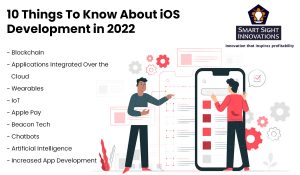 With the increasing popularity of its devices and services ecosystem, iOS has almost 20% of the worldwide market share in the smartphone segment. Although Apple initially only offered one smartphone every year to its consumers, they quickly understood the need to cater to different demographics that led them to offer as many as five different models.
With the increasing popularity of its devices and services ecosystem, iOS has almost 20% of the worldwide market share in the smartphone segment. Although Apple initially only offered one smartphone every year to its consumers, they quickly understood the need to cater to different demographics that led them to offer as many as five different models.
Their services ecosystem provided through their App Store has also kept up with the demands of the modern-day smartphone user with products that give the best experiences – from music to streaming, gaming and utility – Apple has all the solutions and then some. One of the main reasons for the increased acceptance of its products and services despite the steep cost as compared to other options such as Android is the iOS platform, which gives users a very compact and powerful experience across all devices.
Apple is committed to continuing this trajectory of ascendancy that iOS provides its users into the new year. We look at some of the most important aspects that have iOS users as well as iOS app development services providers excited.
1. Blockchain
Blockchain has deep applications across several critical industry segments and helps in decentralizing encryption of sensitive information. With security features that help improve processes as well as monetary transactions, it has wide implications in both the logistical and financial sectors. iOS developers are increasingly including blockchain in their development endeavors for increased security.
2. Applications Integrated Over the Cloud
The cloud is fast becoming a preferred platform for many businesses that have helped users get easy access to data on their handheld devices. Many iOS application development services leverage the cloud to build scalability capabilities for their mobile apps.
3. Wearables
Many iOS developers are continually pushing the boundaries to include newer features in wearable devices. Wearable enthusiasts have already seen the benefits of features such as heart rate and blood oxygen level tracking in the Apple Watch. The future is even more exciting with applications that can track body physiology to determine vital health statistics and go as far as to track the mood of the wearer!
Other potential applications include converting the motion of the wearer to energy and devices that can track gestures that help the user draw virtually in three dimensions or give real-time haptic feedback for holographic interactions.
4. IoT
Apple’s HomeKit framework is a convenient interface to assimilate multiple devices within a network that can be controlled through an app. Many iOS development services utilize this framework to build a smart home network that can be connected to a wearable to communicate with all the devices and exchange critical information.
5. Apple Pay
Apple has consistently exhibited its intentions of keeping customer and financial data secure in all its products and services. Apple Pay is another convenient interface with in-built security features that make it more secure than the average payment platform. Its already existing popularity will only increase in the coming years with features such as embedded NFC payments without the customers having to save their card details.
6. Beacon Tech
First introduced by Apple in 2013, it has continued to perform deeper research over the years to identify more areas of applications. With the help of transmitters that use low-energy Bluetooth technology to send signals to other smart devices in the vicinity, this technology can be used to get information about specific products in a particular location such as a supermarket or a retail outlet that provides relevant product details to consumers who visit the stores.
7. Chatbots
Although many businesses already utilize chatbots to complement their sales and customer support efforts, the upcoming mobile apps are expected to be more intelligent and personalized to specific business segments as well as better under their customer queries to provide quick and pinpoint information.
8. Artificial Intelligence
AI helps mobile apps understand user patterns based on which businesses can curate content to connect with their audience. Apple’s confidence in Core Machine Learning takes advantage of the seamless congruence of its software and hardware to optimize power and memory consumption for better app performance. This can have a considerable impact on AI capabilities such as speech recognition, identity recognition and other areas.
9. Increased App Development Capabilities with Swift 5
Since its release in 2019, Swift has become the platform of choice for iOS app developers with enhanced APIs, a better compiler and protocol extensions that make coding easier. More and more iOS app development services attest to the easy usability and effectiveness of this platform that not only helps build apps quicker but also creates apps that add more value to the end-user.
10. AR, VR and 3D
With the introduction of ARKit in 2018, Apple revolutionized AR and VR capabilities in developing iOS apps. With more features expected to be introduced into ARKit, users are in for a treat with features such as face tracking, environment texturing and detecting 3D objects.











